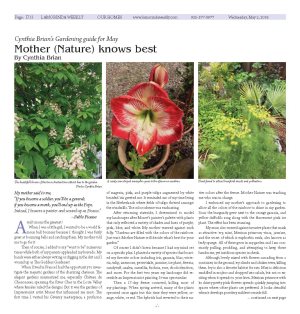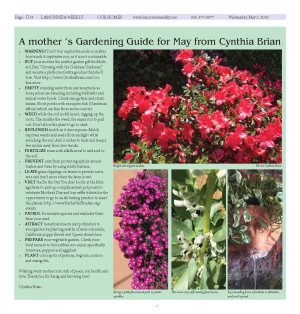|
|
Published May 2nd, 2018
|
Cynthia Brian's Gardening guide for May
|
| Mother (Nature) knows best |
| By Cynthia Brian |
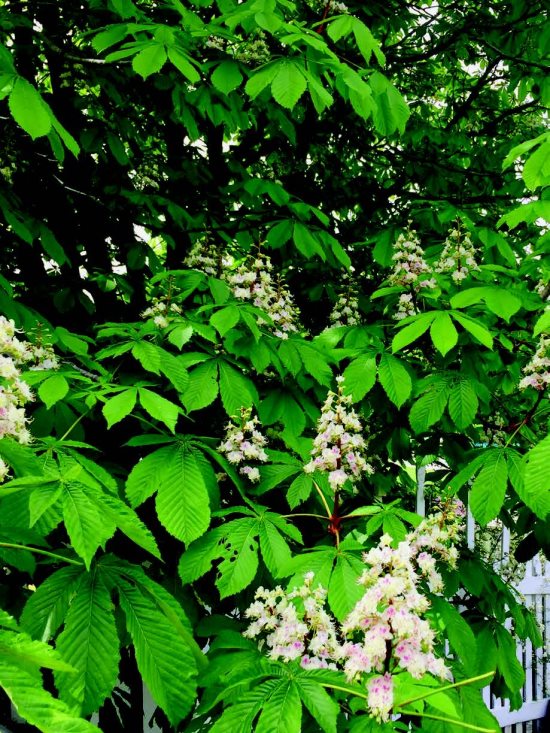 |
| The beautiful blooms of the horse chestnut tree attract bees to the garden. Photos Cynthia Brian |
My mother said to me,
 "If you become a soldier, you'll be a general;
"If you become a soldier, you'll be a general;
 if you become a monk, you'll end up as the Pope.
if you become a monk, you'll end up as the Pope.
 Instead, I became a painter and wound up as Picasso." ~Pablo Picasso
Instead, I became a painter and wound up as Picasso." ~Pablo Picasso
 Aren't moms the greatest?
Aren't moms the greatest?
 When I was a little girl, I wanted to be a world famous ball bouncer because I thought I was fairly great at bouncing balls and catching them. My mother told me to go for it.
When I was a little girl, I wanted to be a world famous ball bouncer because I thought I was fairly great at bouncing balls and catching them. My mother told me to go for it.
 Then of course, I added to my "want to be" numerous times while both of my parents applauded my bravado. My hands were either always writing or digging in the dirt and I wound up as The Goddess Gardener!
Then of course, I added to my "want to be" numerous times while both of my parents applauded my bravado. My hands were either always writing or digging in the dirt and I wound up as The Goddess Gardener!
 When I lived in France I had the opportunity to investigate the majestic gardens of the charming chateaus. The elegant gardens mesmerized me, especially Chateau de Chenonceau spanning the River Cher in the Loire Valley where females ruled the designs. But it was the gardens of Impressionist artist Monet that influenced me most. The first time I visited his Giverny masterpiece, a profusion of magenta, pink, and purple tulips augmented by white bearded iris greeted me. It reminded me of my time living in the Netherlands where fields of tulips thrived amongst the windmills. The color scheme was enchanting.
When I lived in France I had the opportunity to investigate the majestic gardens of the charming chateaus. The elegant gardens mesmerized me, especially Chateau de Chenonceau spanning the River Cher in the Loire Valley where females ruled the designs. But it was the gardens of Impressionist artist Monet that influenced me most. The first time I visited his Giverny masterpiece, a profusion of magenta, pink, and purple tulips augmented by white bearded iris greeted me. It reminded me of my time living in the Netherlands where fields of tulips thrived amongst the windmills. The color scheme was enchanting.
 After returning stateside, I determined to model my landscapes after Monet's painter's palette with plants that only reflected a variety of shades and hues of purple, pink, blue, and white. My mother warned against such folly. "Gardens are filled with the colors of the rainbow. Just wait. Mother Nature will decide what's best for your garden."
After returning stateside, I determined to model my landscapes after Monet's painter's palette with plants that only reflected a variety of shades and hues of purple, pink, blue, and white. My mother warned against such folly. "Gardens are filled with the colors of the rainbow. Just wait. Mother Nature will decide what's best for your garden."
 Of course I didn't listen because I had my mind set on a specific plan. I planted a variety of species that boasted my favorite colors including iris, gazania, lilac, wisteria, tulip, anemone, periwinkle, jasmine, ice plant, freesia, candytuft, azalea, camellia, fuchsia, rose, rhododendron, and more. For the first two years my landscape did resemble an Impressionist painting. It was spectacular.
Of course I didn't listen because I had my mind set on a specific plan. I planted a variety of species that boasted my favorite colors including iris, gazania, lilac, wisteria, tulip, anemone, periwinkle, jasmine, ice plant, freesia, candytuft, azalea, camellia, fuchsia, rose, rhododendron, and more. For the first two years my landscape did resemble an Impressionist painting. It was spectacular.
 Then a 17-day freeze occurred, killing most of my plantings. When spring arrived, many of the plants sprouted once again but this time they were yellow, orange, white, or red. The hybrids had reverted to their native colors after the freeze. Mother Nature was teaching me who was in charge.
Then a 17-day freeze occurred, killing most of my plantings. When spring arrived, many of the plants sprouted once again but this time they were yellow, orange, white, or red. The hybrids had reverted to their native colors after the freeze. Mother Nature was teaching me who was in charge.
 I embraced my mother's approach to gardening to allow all the colors of the rainbow to shine in my garden. Soon the burgundy grew next to the orange gazania, and yellow daffodils sang along with the fluorescent pink ice plant. The effect has been stunning.
I embraced my mother's approach to gardening to allow all the colors of the rainbow to shine in my garden. Soon the burgundy grew next to the orange gazania, and yellow daffodils sang along with the fluorescent pink ice plant. The effect has been stunning.
 My mom also warned against invasive plants that mask as attractive: ivy, mint, Mexican primrose, vinca, jasmine, and the worst of which is euphorbia esula, also known as leafy spurge. All of these grow in my garden and I am constantly pulling, prodding, and attempting to keep these handsome, yet insidious species in check.
My mom also warned against invasive plants that mask as attractive: ivy, mint, Mexican primrose, vinca, jasmine, and the worst of which is euphorbia esula, also known as leafy spurge. All of these grow in my garden and I am constantly pulling, prodding, and attempting to keep these handsome, yet insidious species in check.
 Although lovely mixed with flowers cascading from a container, in the ground, ivy climbs and chokes trees, killing them. Ivy is also a favorite habitat for rats. Mint is delicious muddled in mojitos and chopped into salads, but not so exciting when it spreads to your lawn. Mexican primrose with its dainty pretty pink flowers spreads quickly jumping into spaces where other plants are preferred. It looks dreadful when it develops powdery mildew towards fall. Vinca major (big leaf periwinkle) may take years to become invasive but with conditions of deep shade it can smother the diversity of other plants with its very dense vegetation. Cut it back or pull out the stragglers. Jasmine has the most beautiful fragrance, especially in the evening. A few cut blossoms perfume entire rooms, however, this vine twines around bushes and flora smothering the entire plant. It is critical to contain these plants and keep them in check by pruning and pulling out the ones growing in places you don't desire.
Although lovely mixed with flowers cascading from a container, in the ground, ivy climbs and chokes trees, killing them. Ivy is also a favorite habitat for rats. Mint is delicious muddled in mojitos and chopped into salads, but not so exciting when it spreads to your lawn. Mexican primrose with its dainty pretty pink flowers spreads quickly jumping into spaces where other plants are preferred. It looks dreadful when it develops powdery mildew towards fall. Vinca major (big leaf periwinkle) may take years to become invasive but with conditions of deep shade it can smother the diversity of other plants with its very dense vegetation. Cut it back or pull out the stragglers. Jasmine has the most beautiful fragrance, especially in the evening. A few cut blossoms perfume entire rooms, however, this vine twines around bushes and flora smothering the entire plant. It is critical to contain these plants and keep them in check by pruning and pulling out the ones growing in places you don't desire.
 Which leads me to the worst invasive in my landscape - euphorbia esula, commonly known as green spurge or leafy spurge. A single pot of euphorbia is charming with its magnetic chartreuse leaves and yellowish green bracts. The problem begins when the seed capsules explode sending seeds 15 or more feet in the distance. If allowed in bare soil, the complex root system spreads rapidly both horizontally and vertically for many yards. In spring the plants grow 3 or 4 feet high, blocking sunlight, stealing the water and nutrients from other plants. Toxins in euphorbia esula prevent other plants to thrive. Deer and rabbits won't eat it, although goats and sheep tolerate it. The milky sap is a skin irritant to humans. If left unchecked, this invader will take over hills, dales, and neighborhoods. The striking euphorbia esula encompasses a hillside, yet I am not willing to let trespassers into my formal beds. Daily I patrol and pull out the intruders.
Which leads me to the worst invasive in my landscape - euphorbia esula, commonly known as green spurge or leafy spurge. A single pot of euphorbia is charming with its magnetic chartreuse leaves and yellowish green bracts. The problem begins when the seed capsules explode sending seeds 15 or more feet in the distance. If allowed in bare soil, the complex root system spreads rapidly both horizontally and vertically for many yards. In spring the plants grow 3 or 4 feet high, blocking sunlight, stealing the water and nutrients from other plants. Toxins in euphorbia esula prevent other plants to thrive. Deer and rabbits won't eat it, although goats and sheep tolerate it. The milky sap is a skin irritant to humans. If left unchecked, this invader will take over hills, dales, and neighborhoods. The striking euphorbia esula encompasses a hillside, yet I am not willing to let trespassers into my formal beds. Daily I patrol and pull out the intruders.
 A cavalcade of color delights me in my spring garden. Currently boasting beautiful blooms are bergenia, lavender, ranunculus, Dutch iris, bearded iris, rose, forget-me-not, daffodil, tulip, calla lily, California poppy, snowball, snowdrop, blue star, geranium, calendula, citronella, hyacinth, ice plant, wisteria, lilac, snapdragon, cyclamen, oleander, Jupiter's beard, azalea, fuchsia, breath of heaven, camellia, hellebore, nasturtium, sweet alyssum, osteospermum, cornflag, clematis, mock orange, petunia, wood hyacinth, alpine strawberry, fava beans, and a plethora of other splendid multicolored species.
A cavalcade of color delights me in my spring garden. Currently boasting beautiful blooms are bergenia, lavender, ranunculus, Dutch iris, bearded iris, rose, forget-me-not, daffodil, tulip, calla lily, California poppy, snowball, snowdrop, blue star, geranium, calendula, citronella, hyacinth, ice plant, wisteria, lilac, snapdragon, cyclamen, oleander, Jupiter's beard, azalea, fuchsia, breath of heaven, camellia, hellebore, nasturtium, sweet alyssum, osteospermum, cornflag, clematis, mock orange, petunia, wood hyacinth, alpine strawberry, fava beans, and a plethora of other splendid multicolored species.
 My gardener mom was right about being inclusive with garden color and watchful for the expansion of invasive vigorous vegetation. It is always good to have a guide on the side. Mother Nature will always have the final say.
My gardener mom was right about being inclusive with garden color and watchful for the expansion of invasive vigorous vegetation. It is always good to have a guide on the side. Mother Nature will always have the final say.
 I recently visited my daughter to help with her landscaping needs. When I asked her what she wanted me to plant, she responded, "Mom, you always know best!"
I recently visited my daughter to help with her landscaping needs. When I asked her what she wanted me to plant, she responded, "Mom, you always know best!"
 A mother 's Gardening Guide for May from Cynthia Brian
A mother 's Gardening Guide for May from Cynthia Brian
 WARNING! Don't buy euphorbia esula no matter how much it captivates you, as it is not containable.
WARNING! Don't buy euphorbia esula no matter how much it captivates you, as it is not containable.
 BUY your mother the perfect garden gift for Mother's Day, "Growing with the Goddess Gardener," and receive a plethora of extra goodies that she'll love. Visit http://www.CynthiaBrian.com/online-store
BUY your mother the perfect garden gift for Mother's Day, "Growing with the Goddess Gardener," and receive a plethora of extra goodies that she'll love. Visit http://www.CynthiaBrian.com/online-store
 EMPTY standing water from any receptacle as mosquitoes are breeding including birdbaths and animal water bowls. Check rain gutters and storm drains. Stock ponds with mosquito fish (Gambusia affinis) which are free from vector control.
EMPTY standing water from any receptacle as mosquitoes are breeding including birdbaths and animal water bowls. Check rain gutters and storm drains. Stock ponds with mosquito fish (Gambusia affinis) which are free from vector control.
 WEED while the soil is still moist, digging up the roots. The smaller the weed, the easier it is to pull out. Don't allow the plant to go to seed.
WEED while the soil is still moist, digging up the roots. The smaller the weed, the easier it is to pull out. Don't allow the plant to go to seed.
 REPLENSIH mulch as it decomposes. Mulch deprives weeds and seeds from sunlight while enriching the soil. Add 3 inches to beds and keep a few inches away from tree trunks.
REPLENSIH mulch as it decomposes. Mulch deprives weeds and seeds from sunlight while enriching the soil. Add 3 inches to beds and keep a few inches away from tree trunks.
 FERTILIZE roses with alfalfa meal to add acid to the soil.
FERTILIZE roses with alfalfa meal to add acid to the soil.
 PREVENT ants from protecting aphids around bushes and trees by using sticky barriers.
PREVENT ants from protecting aphids around bushes and trees by using sticky barriers.
 LEAVE grass clippings on lawns to provide nutrients and don't mow when the lawn is wet.
LEAVE grass clippings on lawns to provide nutrients and don't mow when the lawn is wet.
 VISIT the Be the Star You Are! booth at the Moraga Faire to pick up complimentary potpourri to celebrate Mother's Day and buy raffle tickets for the opportunity to go to an A's batting practice to meet the players.
http://www.BetheStarYouAre.org/events
VISIT the Be the Star You Are! booth at the Moraga Faire to pick up complimentary potpourri to celebrate Mother's Day and buy raffle tickets for the opportunity to go to an A's batting practice to meet the players.
http://www.BetheStarYouAre.org/events
 PATROL for invasive species and eradicate them from your yard.
PATROL for invasive species and eradicate them from your yard.
 ATTRACT beneficial insects and pollinators to your garden by planting swaths of aster calendula, California poppy, fennel and Queen Anne's lace.
ATTRACT beneficial insects and pollinators to your garden by planting swaths of aster calendula, California poppy, fennel and Queen Anne's lace.
 PREPARE your vegetable garden. Check your local nursery to buy edibles you enjoy, specifically tomatoes, peppers and eggplant.
PREPARE your vegetable garden. Check your local nursery to buy edibles you enjoy, specifically tomatoes, peppers and eggplant.
 PLANT color spots of petunia, begonia, cosmos and marigolds.
PLANT color spots of petunia, begonia, cosmos and marigolds.

 Wishing every mother a month of peace, joy, health and love. Thank you for being and knowing best!
Wishing every mother a month of peace, joy, health and love. Thank you for being and knowing best!

 Cynthia Brian
Cynthia Brian


|
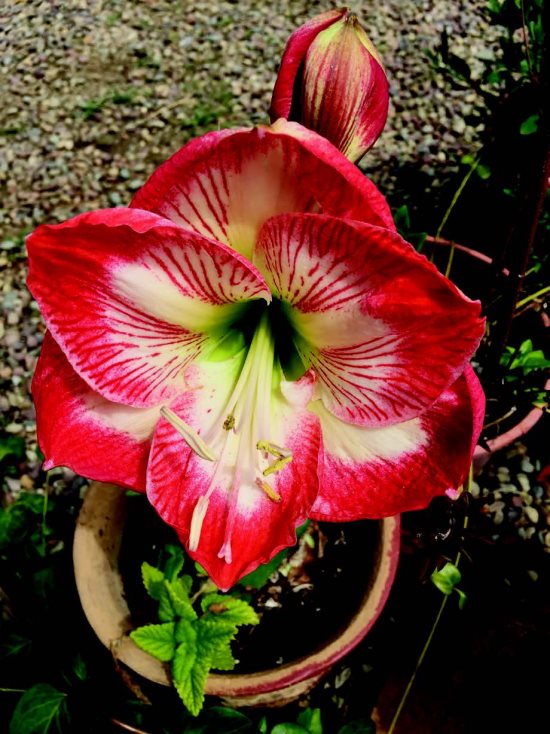 |
| A candy cane striped amaryllis opens in the afternoon sunshine. |
 |
| Plant fennel to attract beneficial insects and pollinators. |
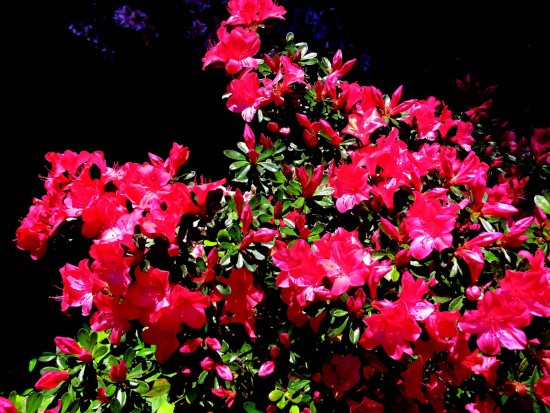 |
| Bright and elegant azaleas. Photos Cynthia Brian |
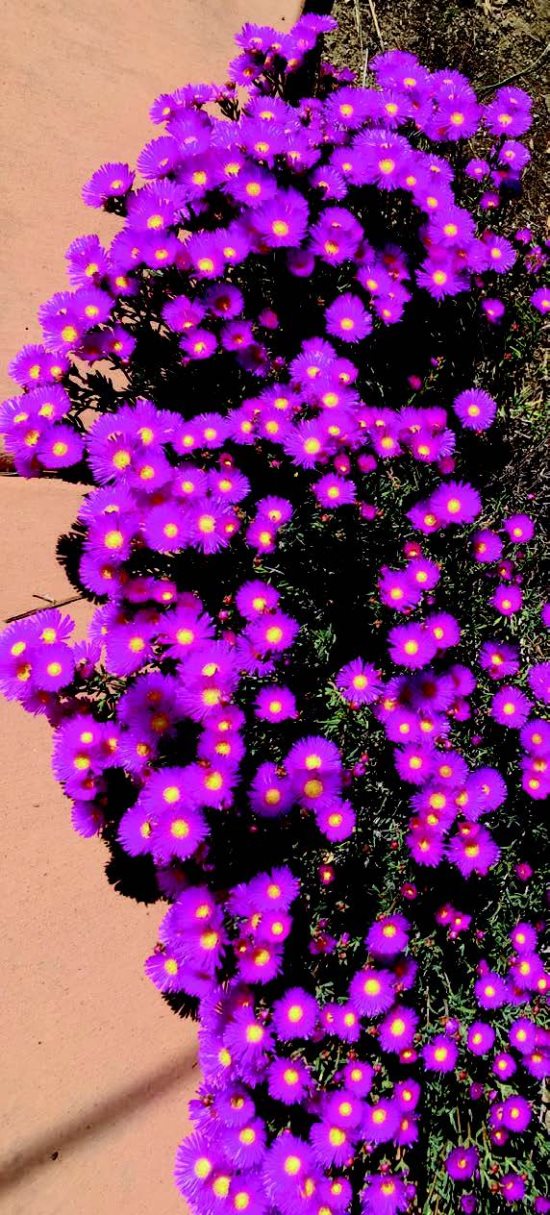 |
| Along a path, fluorescent pink ice plant |
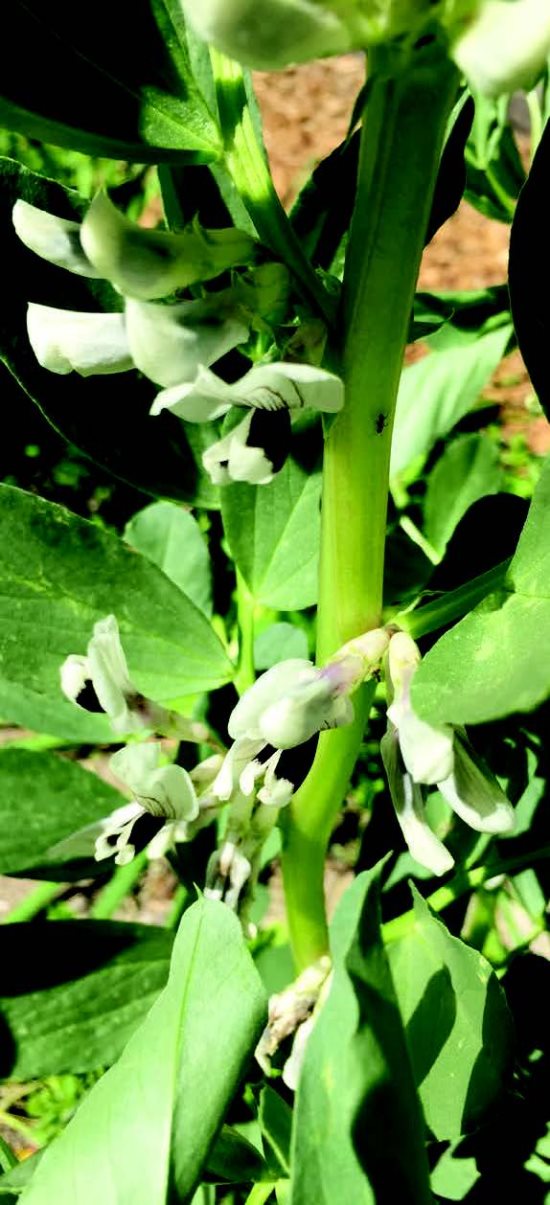 |
| The cover crop of flowering fava
beans. |
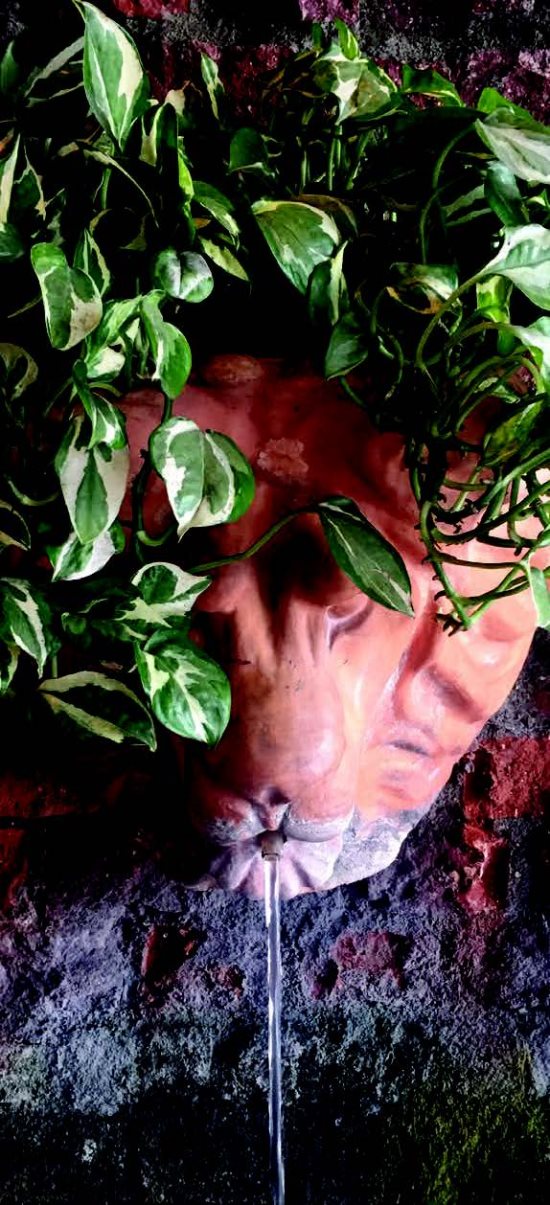 |
| Ivy cascading from a fountain
is attractive |
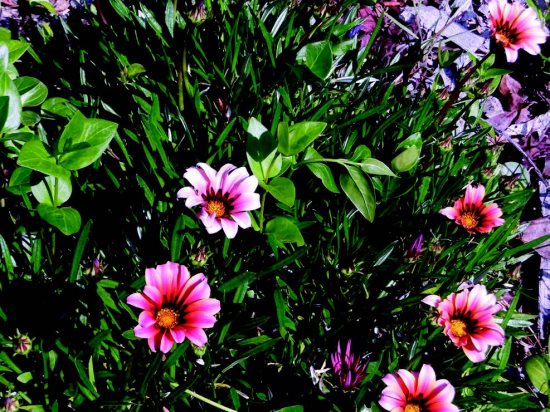 |
| Burgundy
gazania mixed with vinca major. |
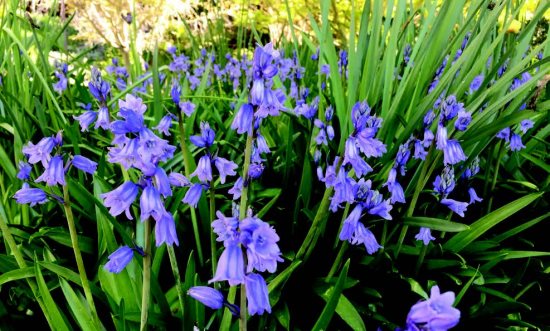 |
| Sky blue wood hyacinths. |
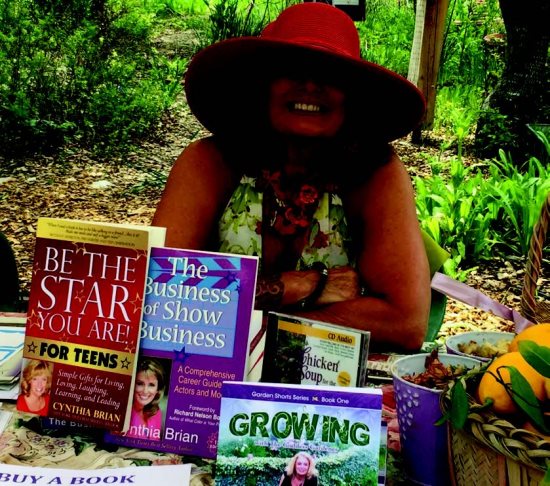 |
| Come visit
Cynthia Brian at the Moraga Faire on Saturday, May 12 in the Be the
Star You Are!(r) booth. Cynthia Brian, The Goddess Gardener, raised in
the vineyards of Napa County, is a New York Times best selling author,
actor, radio personality, speaker, media and writing coach as well as
the Founder and Executive Director of Be the Star You Are1(r) 501 c3.
Tune into Cynthia's Radio show and order her books at
www.StarStyleRadio.com.
Buy a copy of the new book, Growing with the Goddess Gardener, at
www.cynthiabrian.com/online-store. Available for hire for projects
and lectures.
Cynthia@GoddessGardener.com
www.GoddessGardener.com |
|
|
|












